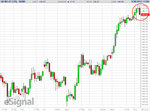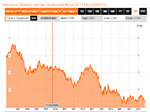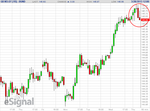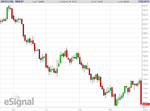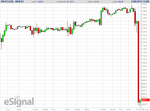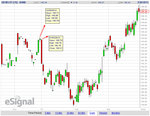Yamato
Legendary member
- Messages
- 9,840
- Likes
- 246
Europe Factors to Watch-Shares seen flat to lower, all eyes on Cyprus | Reuters
Remember Italy? The Market Does - The Euro Crisis - WSJ
In Italy, Talks on Forming Government Break Down - NYTimes.com
Today, according to the journalists, there will be some news that will drive the BUND down, any news. And then the papers will say it all happened because of the news, whereas it was because it had risen too much.
Every week, for the past 10 years, there has been a tendency for markets to rise in the second part of the week, and viceversa in the first part, especially on Tuesday. The opposite tendency is in place for bond futures (GBL and ZN). Each time the newspapers motivate these rises and falls with news releases. Obviously these journalists, too, are lower forms of intelligence.
Thu Mar 28, 2013 3:27am EDT
PARIS, March 28 (Reuters) - European stocks are seen flat to lower on Thursday, as concerns about a potential run on Cyprus's banks, which are set to reopen almost two weeks after being shut by the government, kept investors on edge.
At 0715 GMT, futures for the Euro STOXX 50, for the UK's FTSE 100, for Germany's DAX and for France's CAC were flat to down by 0.07 percent.
Tight controls will be imposed on transactions by Cyprus's banks to limit cash withdrawals to no more than 300 euros ($380) per day, ban the cashing of cheques and bar businesses from transferring money abroad unless they can show it is for imports.
"The market will be watching unenviably at the droves of individuals who will be waiting in line to withdraw the small amount of cash they can to basically survive in Cyprus," IG chief market strategist Chris Weston wrote in a
note.
"One has to wonder about the longer-term implications on this tiny economy. It can't be good, and we will go through this all again with Slovakia at some stage given the 7 billion euros of bad loans - around 20 percent of GDP - on its balance sheets."
On Wednesday, investors shied away from Spanish and Italian bonds, with sluggish demand at an Italian debt auction, and turned to low-risk German debt.
Italian banks will be in the spotlight on Thursday, with Banca Monte dei Paschi di Siena set to post a 2.5 billion euro loss as it books higher bad debt provisions and losses on derivatives trades targeted by a fraud investigation.
European stocks have sharply rallied since mid-2012 - with the Euro STOXX 50 gaining about 30 percent - lifted by the European Central Bank's pledge to safeguard the euro, which eased fears of a break-up of the region's currency bloc.
The rally lost steam recently, however, stalled by the return of jitters about political risks in the euro zone, such as the political impasse in Italy following last month's inconclusive election, a corruption scandal in Spain and Cyprus's mounting debt crisis, which have prompted investors to book some gains and move to the sidelines.
The pull-back has been particularly sharp for banking stocks, with the euro zone STOXX banking sector index down 21 percent since a peak in late January, while the broad STOXX Europe 600 is down 2.2 percent from a
near five-year high hit earlier this month...
Remember Italy? The Market Does - The Euro Crisis - WSJ
“Oh yeah, Italy. Forgot about that.”
That’s the line in financial markets Wednesday.
For a week or so, traders seemed to forget all about it. Cyprus was the only game in town, with shock at the initial deal put together and wrangling over how to forge a new one.
The drama is not over, clearly. Capital controls on the island could be in place for months. Savers and holders of bank bonds may never sleep quite so easily in their beds again, amid genuine confusion over whether the Cyprus bailout may prove to be a model for others in future. (If you drink an espresso every time you see a conflicting headline on this theme, you’ll be feeling pretty wired by now.)
Still, there’s a deal for Cyprus. The worst-case scenarios have not materialized, yet.
So, traders and investors appear suddenly to have remembered that Italy held an election last month, and there’s still no government in place. This is what everyone was worrying about before the Cyprus crisis came along.
Helping to jog traders’ memory, Pier Luigi Bersani — he who was expected to be king by this point — today saw a fresh setback in his efforts to form a governing alliance after the upstart Five-Star Movement refused to back him. Given that Mr. Bersani says he would never seek an alliance with Silvio Berlusconi‘s center-right coalition, it is tough to see a way forward.
In Italy, Talks on Forming Government Break Down - NYTimes.com
...As the stalemate continues, the difference in borrowing costs between Italy and benchmark German bonds has been rising, putting Italy at greater risk of market speculation. The Italian economy is expected to contract 1 percent this year, according to the Bank of Italy, and unemployment is now beyond 11 percent...
Today, according to the journalists, there will be some news that will drive the BUND down, any news. And then the papers will say it all happened because of the news, whereas it was because it had risen too much.
Every week, for the past 10 years, there has been a tendency for markets to rise in the second part of the week, and viceversa in the first part, especially on Tuesday. The opposite tendency is in place for bond futures (GBL and ZN). Each time the newspapers motivate these rises and falls with news releases. Obviously these journalists, too, are lower forms of intelligence.
Last edited:

